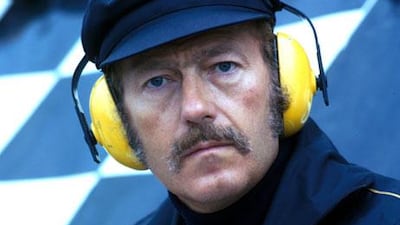Colin Chapman was a debonair Englishman who was a visionary engineer, suave salesman and ruthless businessman. These qualities took him and Lotus to the front of the motorsport grid, where he led the way in transforming Formula One into the glamorous multi-million dollar industry it is today.
When he died of a heart attack in 1982, at the age of 54, he was at the pinnacle of his career and Lotus was one of the most respected and successful marques in racing history. In the aftermath of his death, his life and achievements were immortalised as the stuff of legend. But almost 30 years on, a darker side to this saint of Silverstone has emerged that paints Chapman not as a hero, but as a reckless egotist who was fixated on success, whatever the cost.
Chapman studied structural engineering at University College London and joined an aluminium firm but, like so many inventors, his real work began when he left his corporate desk and went home to the solitude of his garage. In 1949, he built his first sports car from a modified Austin Seven. Proud of his creation, he entered it in a trials race, which it won, giving him a taste for the chequered flag and convincing him to focus on racing cars. With a loan of £25 from his fiancée he formed the Lotus company, named, perhaps in tribute, after his pet name for her. The rest, as they say, is history, or, in F1 circles, legend.
A mere 10 years on from the foundation of the company, Lotus claimed its first grand prix victory in 1962 and went on to win a further 71 over the next two decades, claiming seven constructors' titles.
Lacking the resources and heritage of rivals Ferrari and Maserati, Lotus claimed a competitive edge through ingenious design and technological advances, including strut suspension, the monocoque chassis and innovations in downforce and aerodynamics. Chapman, with startling blue eyes and trademark moustache, was the heart and soul of the team and was the only boss to dirty his knees in the paddock, making technical adjustments. But though he remained a hands-on engineer he also proved himself to be a shrewd businessman. He was the first to adorn his cars with advertising and, in doing so, brought unprecedented investment into the sport. The black-and-gold John Player Lotus remains one of the most iconic and recognisable images in Formula One. With business acumen, charm and a proven record of track success, Chapman was supported by many as a successor to Bernie Ecclestone to lead F1.
Success, as the proverb goes, can be hard to come by and some will go to any lengths to achieve it. Chapman's notebook from 1975, recently on display at the Frankfurt Motor Show, sheds light on a man for whom failure was simply not an option. With a chilling brevity Chapman notes, "A racing car has only one objective: to win motor races. If it does not, it is nothing but a waste of time and money. It does not matter how ... safe it is, if it does not consistently win it is nothing." These words were written only a few years after Chapman's great friend and champion driver Jim Clark died due to what many think was a technical fault with his car. Clark's successor, Jochen Rindt, wrote to Chapman saying his Lotus would still be competitive if a few pounds were added to make it stronger. This plea wasn't heeded and, soon after, Rindt shared Clark's tragic fate.
In what would be the final chapter of Chapman's life, this blind ambition and almost callous pursuit of success whatever the means or cost nearly proved his undoing. Sensing a golden handshake, Chapman entered into partnership with John DeLorean in his ill-fated, Belfast-based sports car project. With Chapman behind it, by then a Commander of the British Empire, the British government provided more than £50 million (Dh283m) of investment. About £10m of this never reached Belfast. Chapman came under suspicion but his death meant that he never stood trial. The judge later asserted that had he been in the dock he would have received a sentence of at least 10 years. Chapman avoided this infamy, ensuring that his reputation would remain untainted and that he would forever be a revered name in motorsport.

